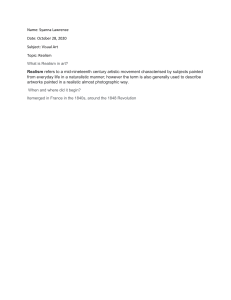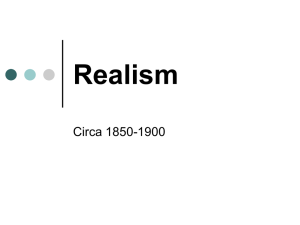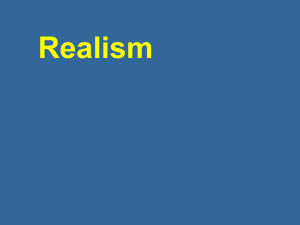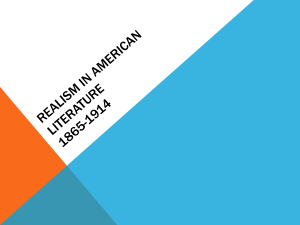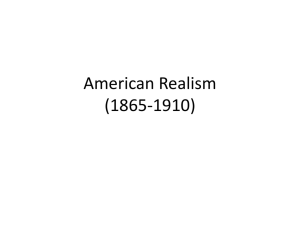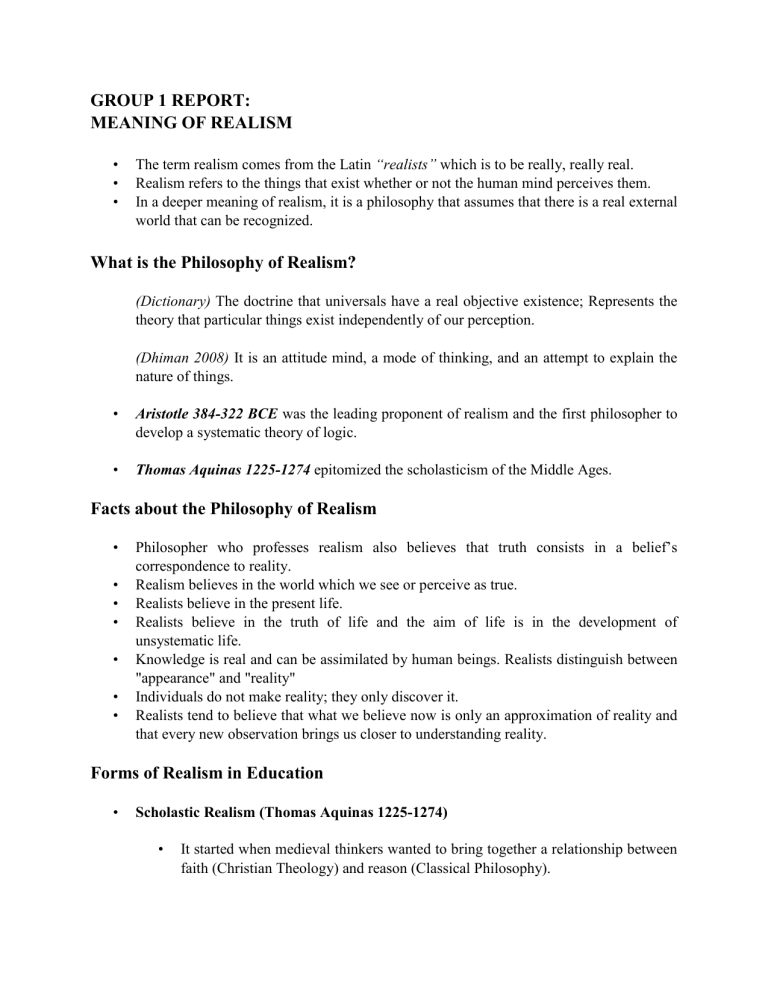
GROUP 1 REPORT: MEANING OF REALISM • • • The term realism comes from the Latin “realists” which is to be really, really real. Realism refers to the things that exist whether or not the human mind perceives them. In a deeper meaning of realism, it is a philosophy that assumes that there is a real external world that can be recognized. What is the Philosophy of Realism? (Dictionary) The doctrine that universals have a real objective existence; Represents the theory that particular things exist independently of our perception. (Dhiman 2008) It is an attitude mind, a mode of thinking, and an attempt to explain the nature of things. • Aristotle 384-322 BCE was the leading proponent of realism and the first philosopher to develop a systematic theory of logic. • Thomas Aquinas 1225-1274 epitomized the scholasticism of the Middle Ages. Facts about the Philosophy of Realism • • • • • • • Philosopher who professes realism also believes that truth consists in a belief’s correspondence to reality. Realism believes in the world which we see or perceive as true. Realists believe in the present life. Realists believe in the truth of life and the aim of life is in the development of unsystematic life. Knowledge is real and can be assimilated by human beings. Realists distinguish between "appearance" and "reality" Individuals do not make reality; they only discover it. Realists tend to believe that what we believe now is only an approximation of reality and that every new observation brings us closer to understanding reality. Forms of Realism in Education • Scholastic Realism (Thomas Aquinas 1225-1274) • It started when medieval thinkers wanted to bring together a relationship between faith (Christian Theology) and reason (Classical Philosophy). • • • • • Humanistic Realism (Francois Rabelais 1483-1553) (John Milton 1608-1741) • • • • • • St. Thomas Aquinas who wrote Summa Theologica used philosophy to help explain the doctrine and mysteries of the church. Characteristics: Relied on authorities from the past; synthesizing of knowledge; deductive approach to reasoning; use of syllogistic logic Scholastic schools had two methods of teaching: 1."lectio" (the simple reading of a text by teacher/ no questions were permitted); 2. "disputatio" (where the question to be disputed was announced beforehand) Education is the process by which he lifts himself up to the eternal. It sprang up after the Renaissance. lt studies the present solution to each problem of life. Aimed to secure knowledge of human society and its institutions of nature and man's reactions to nature, chiefly through the content and not the form of classics. John Milton •Education must prepare one for life in the real world. Francois Rabelais Education is gained through books, though emphasis should be on the mastery of their content and their actual use in one's life. Education should be attractive rather than compulsive. Francois Rabelais • Education is gained through books, though emphasis should be on the mastery of their content and their actual use in one's life. Education should be attractive rather than compulsive. Social Realism (Michael De Montaigne 1533-1592) • • • • • • • Social Realism in education is the reaction against a type of education that produces scholars and professional men to the neglect of the man of affairs i.e. practice. Education should not produce men who are unfit for social life. The purpose of education, according to social realists, is to prepare the practical man of the world. Direct contact with things, people & social conditions thru travel rather than books. Study of gymnastics, sports, riding, modern languages, and customs of other countries Study of one's self but also others Social realism explains that education should equip learners for a happy and successful life as a man of the world. According to Montaigne, The aim of education is to inculcate intellect & logic in man by which he can lie his life well. He emphasized a teaching method that was according to the natural tendencies & development of a child. He was against • • • • • Sense Realism (Francis Bacon 1561-1626) (John Amos Comenius 1592-1670) • • • • • • • • • • • expressionistic discipline. He said, & quote "To make it of any real value you must not only get it into their minds but espouse them to it." Direct contact with things, people & social conditions thru travel rather than books. Study of gymnastics, sports, riding, modern languages, and customs of other countries Study of one's self but also others. Social realism explains that education should equip learners for a happy and successful life as a man of the world. (John Locke 1632-1704) (Richard Mulcaster 1531-1611) (Wolfgang Ratke 1571 to 1635) The sense realism in education emphasizes the training of the senses. Senses are the gateways of knowledge and learning takes place through the operation of the senses. According to sense-realists nature is the treasure house of all knowledge and this knowledge can be obtained through the training of the senses. Sense-realism attached more importance to the study of natural sciences and contemporary social life. Aim: To develop a natural society by working in accord with the laws of nature Purpose: Happiness with God Thru education, man can still know laws of nature and thereby control nature. It came into being in the 17th century according to which knowledge can be gained through our senses. Hence a child should be trained with the help of objects. According to Munroe, scientific research has influenced sense realism. Hence the child should be bought in contact with nature. Sense Realism has preferred education of nature, observation, and science in place of language & literature. Teaching methods should be scientific and inductive, based on observation, analysis, and synthesis. Stressed on physical education. The sense-realists emphasized three things: a) Application of the inductive method formulated by Bacon in order to organize and simplify the instructional process. b) To replace instruction in Latin with instruction in Vernacular, and c) To substitute new scientific and social studies in place of the studies in language and literature. Neo-Realism (Alfred North Whitehead; Bertrand Russell) • Neo-Realism is really a philosophical thought. It appears the methods and results of modern development in physics. They do not consider the scientific principles everlasting while they express their changeability in them. They support the education of art with the science and analytical system of education with humanistic feelings. Realism and Aims of Education • The goal of education is to help individuals understand & apply the principles of science • • • • to help solve the problems in the world. Understanding the material world through inquiry. A study of science and the scientific method A need to know the world in order to ensure survival and good life. Basic, essential knowledge with a no-nonsense approach transmit culture and develop human nature Implications of Realism in Education • Realism stresses out that education should address itself immediately to the realities of • • life. Education is expected to provide adequate training for the practical living t meet successfully the vicissitudes of life. Use of objects in education. -Maria Montessori. Realism and the Teacher • Supreme -brings the child in touch with external realities of life. • Imparts scientific knowledge in an easy and effective way • Gets testing results that can help prove that the students are learning the material • A teacher should be educated and well versed with the customs of belief and rights and • • • • • • duties of people, and the trends. He must have full mastery of the knowledge of present life. He must be able to expose and guide the student towards the hard realities of life. (Neither pessimist, nor optimist He must be able to co-relate between utility in daily life and education. He should define simple rules. He should teach subjects in proper order. He needs to find out the interest of the child and to teach accordingly. Methods of Teaching • • • • • Emphasis on critical reasoning through observation Supports accountability and performance-based teaching Scientific research and development Mastery of facts: Recitation, experimentation, demonstration, drills, exercises Education should proceed from simple to complex and from concrete to abstract. • • • • • Enhanced learning thru direct or indirect experiences: Field trips, lectures, films, TV, audio-visual aids, computer technology & library. Learning is based on facts - analysis - questioning. Vernacular to be the medium of instruction. Precision and order: ringing bells, time periods, daily lesson plans, pre-packaged curriculum materials. Children should be given positive rewards
